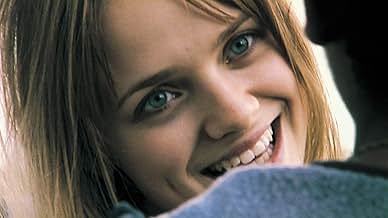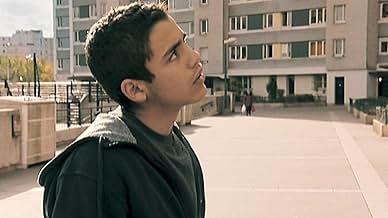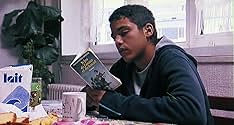PUNTUACIÓN EN IMDb
6,9/10
3,3 mil
TU PUNTUACIÓN
Krimo un chico tímido de 15 años se enamora de Lídia que es su compañera de clase, para poder asumir su amor por ella decide participar en la obra de teatro que iba a ser uno de sus amigos.Krimo un chico tímido de 15 años se enamora de Lídia que es su compañera de clase, para poder asumir su amor por ella decide participar en la obra de teatro que iba a ser uno de sus amigos.Krimo un chico tímido de 15 años se enamora de Lídia que es su compañera de clase, para poder asumir su amor por ella decide participar en la obra de teatro que iba a ser uno de sus amigos.
- Dirección
- Guión
- Reparto principal
- Premios
- 16 premios y 5 nominaciones en total
Meriem Serbah
- Krimo's Mother
- (as Meryem Serbah)
Reseñas destacadas
This movie is getting fresh exposure in France thanks to its win at Les Césars, or the "French Oscars" as other countries like to call them. Its success will probably mean that it now gets exposure outside the country, too, and I wonder how successfully.
Though an accurate and contemporary examination of France, the film's world is a foreign one, even to many people living here--the specificity of the setting (the projects, in a "suburb" of Paris), the language (rapid-fire, slangy, "vulgar", and peppered with "verlan", a street language of inverted syllables--the word itself could translate as "wardsback", and how anyone will translate this dialogue I have no idea), and the behavior (mostly arguing--strident, pushy, beautifully repetitive) may not play clearly outside of France. I'm not sure how clearly it plays here, or how willing people are to watch it, especially as it turns the idea of the scary bad French projects somewhat on its ear.
This isn't a criticism of the movie; on the contrary. Kechiche has shot a riveting cross-section of teenagers growing up in social housing, in broken homes and poverty, who lack the tools of expression, and who have adopted the posturing of the wounded (and, in the story, almost entirely absent) adults who raise them, attacking (the movie unfolds at a near-constant level of verbal aggression) and dodging ("esquiver" means "to dodge" or "to evade") one another's attacks with all they can muster.
The film's intensely political side feels almost accidental; in its unfolding, it has great heart, and its actors, who are apparently mostly amateurs from around the shooting location, are outstanding. On the whole, it reminded me a great deal of David Gordon Green's George Washington: a simple love story set against a landscape of poverty, played out frankly and honestly, allowed to unfold at a distinctly un-Hollywoodian rhythm. If Green's film is more beautiful cinematic ally, L'Esquive is more concentrated, more unflinching in its examination of the deep repercussions and violence of economic, social, and familial hardship. Its statement that France is no longer a country of the French-of-French-ancestry, and that its refusal to accept its own transformation does not mean its lost generation accepts its loss, could not be more clearly nor more poignantly made.
Without spoiling or going into detail, there are things about the plot that are implausible, things that probably hurt the film overall, but watching this movie for plot is like watching Ocean's Eleven for social insight. This is a positive study of character in a bad situation, of a stratum of society rarely filmed and still more rarely treated as fairly as it is offered up here, beautifully and eloquently.
Though an accurate and contemporary examination of France, the film's world is a foreign one, even to many people living here--the specificity of the setting (the projects, in a "suburb" of Paris), the language (rapid-fire, slangy, "vulgar", and peppered with "verlan", a street language of inverted syllables--the word itself could translate as "wardsback", and how anyone will translate this dialogue I have no idea), and the behavior (mostly arguing--strident, pushy, beautifully repetitive) may not play clearly outside of France. I'm not sure how clearly it plays here, or how willing people are to watch it, especially as it turns the idea of the scary bad French projects somewhat on its ear.
This isn't a criticism of the movie; on the contrary. Kechiche has shot a riveting cross-section of teenagers growing up in social housing, in broken homes and poverty, who lack the tools of expression, and who have adopted the posturing of the wounded (and, in the story, almost entirely absent) adults who raise them, attacking (the movie unfolds at a near-constant level of verbal aggression) and dodging ("esquiver" means "to dodge" or "to evade") one another's attacks with all they can muster.
The film's intensely political side feels almost accidental; in its unfolding, it has great heart, and its actors, who are apparently mostly amateurs from around the shooting location, are outstanding. On the whole, it reminded me a great deal of David Gordon Green's George Washington: a simple love story set against a landscape of poverty, played out frankly and honestly, allowed to unfold at a distinctly un-Hollywoodian rhythm. If Green's film is more beautiful cinematic ally, L'Esquive is more concentrated, more unflinching in its examination of the deep repercussions and violence of economic, social, and familial hardship. Its statement that France is no longer a country of the French-of-French-ancestry, and that its refusal to accept its own transformation does not mean its lost generation accepts its loss, could not be more clearly nor more poignantly made.
Without spoiling or going into detail, there are things about the plot that are implausible, things that probably hurt the film overall, but watching this movie for plot is like watching Ocean's Eleven for social insight. This is a positive study of character in a bad situation, of a stratum of society rarely filmed and still more rarely treated as fairly as it is offered up here, beautifully and eloquently.
10fedka2
This is a dream film, of which I am so entirely thrilled that it received so many awards over the mediocre but over hyped Rois et reine. The self effacement of the director in this film is impeccable, one has the eerie sense of watching a Fred Wiseman documentary. It is true that dialogue can run long and circuitously, but for those with my taste for extreme realism this can only be a downside if the acting is poor, and in l'esquive it is not. The acting is on the contrary frighteningly good, whatever self consciousness the members of this young cast might have before the camera is immediately absorbed in the documentary-like mise en scene, that is to say, it only furthers the sensibilities and aesthetic as a whole. L'esquive is a singular film that we can only hope will influence a generation of young French filmmakers who are tired of the well lit, over produced cinema this country is getting far too comfortable with.
I really did like this film! - those viewers, French or otherwise, who have seen, and been able to follow the sound track of La Haine, will be quite at home in this environment, will know what to expect, and will be sensitive to the message the film conveys. True, it may lack the sort of 'excitement'that some film-goers may seek, but one has to take it for what it is: a hard-hitting social document which will resonate with many who are familiar with the inner-city tensions found in many French towns in recent years. The gambit of choosing amateur actors worked very well,in my opinion, a point which other viewers seem to echo.
This French film is a quite disheartening look at life in the public housing projects outside Paris. In a crumbling neighborhood with a majority of immigrants from Northern Africa, a high school tries to produce a play by Pierre Marivaux (1688-1763). The heart of the film is the budding romance between the vivacious blonde Lydia (one of the few "native" French living in the neighborhood) and the shy and painfully inarticulate Krimo, who is ridiculized by his thuggish friends for taking a part in the play. All the kids speak in an unintelligible slang, which makes a contrast with the classical French of Marivaux. I wrote it was disheartening (despite not being a drama) because it shows that the marginalized inhabitants of the projects have an almost nil chance of breaking into the mainstream of French society. Thoughtful and worth seeing.
"Games of Love and Chance (L'Esquive)" is an involving experiment in giving classic French comedy of errors relevance to today, in a dramatic demonstration of "Plus ça change, plus c'est la meme chose" -- the more things change, the more they stay the same.
Writer/director Abdellatif Kechiche juxtaposes the titular 18th century work by Marivaux with junior high kids in a poor, inner city Arab immigrant neighborhood, for an effect that crosses Larry Clark's "Kids" with "Mad Hot Ballroom." Like any period farce, the real relationships are dizzyingly circular: A loves B who loves C who is in disguise with D. A threatens C, B changes places with D to pursue his suit and use Marivaux like Cyrano, C can't make up her mind, friends of B and C misunderstand everyone, and the course of true love doesn't run smooth.
While marred by wincingly heavy-handed intellectualizing on class social criticism by the literature teacher who is directing the kids in the play and a deus ex machina insertion of biased cops, the frank life and death-ness of adolescent romance strongly comes through in comparison to Marivaux's mannered floweriness, even as these kids communicate amongst each other with four letter obscenities, bluntly crude slang (that may not be too well represented in the English subtitles but I'm sure French subtitlers likewise have trouble with the patois in movies such as "Four Brothers"), heart-tugging looks of longing, painfully hurt tears, and, finally in frustration, physical action.
It is not clear if "the blonde" as she is referred to in the English subtitles (played by the excellent Sara Forestier, who seems to have been the only member of the cast with some previous experience before the cameras) is also from an immigrant family or Muslim, or if she just picked up use of a couple of Muslim catch phrases in her slang as to whether Kechiche is adding another layer of social commentary. Or she could just be part of the trend in French cinema to fixate on pouty young blonde temptresses, viz. "La Petite Lili," "À Tout de Suite (Right Now)," "Lila Says (Lila dit ça)."
This film has a lot of parallels with "Lila Says (Lila dit ça)," not just about sex and social setting, though it dealt with older kids, but also how literature can be an escapist outlet yet also a threat that brings hidden emotions to the fore.
The grim mise en scene makes wonderful use of a crowded, high rise neighborhood where the kids hang out chilled because they have little privacy at home, some fathers are in jail, their loving mothers try to keep tabs on them, and cell phones are their expensive lifelines.
While the film goes on a bit too long as scenes meander, probably because it isn't clear how much has been scripted and how much the kids are very effectively improvising particulars around a basic story line, their relationships are enthralling, both the romances and the friendships. Each teen actor creates an indelible and different character.
270 years since Marivaux and the human heart hasn't changed.
Writer/director Abdellatif Kechiche juxtaposes the titular 18th century work by Marivaux with junior high kids in a poor, inner city Arab immigrant neighborhood, for an effect that crosses Larry Clark's "Kids" with "Mad Hot Ballroom." Like any period farce, the real relationships are dizzyingly circular: A loves B who loves C who is in disguise with D. A threatens C, B changes places with D to pursue his suit and use Marivaux like Cyrano, C can't make up her mind, friends of B and C misunderstand everyone, and the course of true love doesn't run smooth.
While marred by wincingly heavy-handed intellectualizing on class social criticism by the literature teacher who is directing the kids in the play and a deus ex machina insertion of biased cops, the frank life and death-ness of adolescent romance strongly comes through in comparison to Marivaux's mannered floweriness, even as these kids communicate amongst each other with four letter obscenities, bluntly crude slang (that may not be too well represented in the English subtitles but I'm sure French subtitlers likewise have trouble with the patois in movies such as "Four Brothers"), heart-tugging looks of longing, painfully hurt tears, and, finally in frustration, physical action.
It is not clear if "the blonde" as she is referred to in the English subtitles (played by the excellent Sara Forestier, who seems to have been the only member of the cast with some previous experience before the cameras) is also from an immigrant family or Muslim, or if she just picked up use of a couple of Muslim catch phrases in her slang as to whether Kechiche is adding another layer of social commentary. Or she could just be part of the trend in French cinema to fixate on pouty young blonde temptresses, viz. "La Petite Lili," "À Tout de Suite (Right Now)," "Lila Says (Lila dit ça)."
This film has a lot of parallels with "Lila Says (Lila dit ça)," not just about sex and social setting, though it dealt with older kids, but also how literature can be an escapist outlet yet also a threat that brings hidden emotions to the fore.
The grim mise en scene makes wonderful use of a crowded, high rise neighborhood where the kids hang out chilled because they have little privacy at home, some fathers are in jail, their loving mothers try to keep tabs on them, and cell phones are their expensive lifelines.
While the film goes on a bit too long as scenes meander, probably because it isn't clear how much has been scripted and how much the kids are very effectively improvising particulars around a basic story line, their relationships are enthralling, both the romances and the friendships. Each teen actor creates an indelible and different character.
270 years since Marivaux and the human heart hasn't changed.
¿Sabías que...?
- CuriosidadesThe movie is dedicated Slaheddine.
- ConexionesReferenced in Leçon de cinéma: Arnaud Desplechin et Mathieu Amalric (2019)
- Banda sonoraWarini Werak Tergoud
Performed by Cheba Zahouania
Written and Composed by Cheikha Rimitti
Production: MLP / History
Selecciones populares
Inicia sesión para calificar y añadir a tu lista para recibir recomendaciones personalizadas
- How long is Games of Love and Chance?Con tecnología de Alexa
Detalles
- Fecha de lanzamiento
- País de origen
- Idioma
- Títulos en diferentes países
- Games of Love and Chance
- Localizaciones del rodaje
- Saint-Denis, Seine-Saint-Denis, Francia(Cité des Francs-Moisins: housing complex, Rue du M.al Lyautey: police control)
- Empresas productoras
- Ver más compañías en los créditos en IMDbPro
Taquilla
- Recaudación en Estados Unidos y Canadá
- 8085 US$
- Fin de semana de estreno en EE. UU. y Canadá
- 2529 US$
- 4 sept 2005
- Recaudación en todo el mundo
- 1.747.263 US$
- Duración1 hora 57 minutos
- Color
- Mezcla de sonido
- Relación de aspecto
- 1.85 : 1
Contribuir a esta página
Sugerir un cambio o añadir el contenido que falta

Principal laguna de datos
By what name was La escurridiza, o cómo esquivar el amor (2003) officially released in India in English?
Responde






















